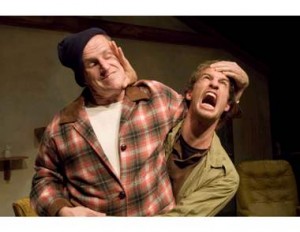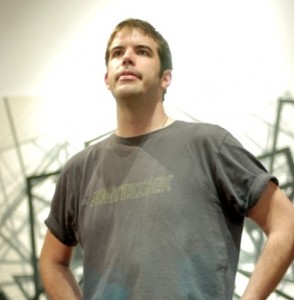Center City actress Polly MacIntyre’s “Belles of Dublin” is returning for its third engagement at the Society Hill Playhouse. The night of songs and stories, adapted from the works of Irish author Edna O’Brien, is starting to seem like a Philadelphia St. Patrick’s Day weekend tradition. But the critically praised show might never have made it to the stage at all, were it not for one incredibly enthusiastic singer.
Back in 2006, MacIntyre was in a master acting class at Philly’s old Triangle Theater with George DiCenzo. As part of the class, MacIntyre was expected to bring in and perform a monologue.
“I had written some original monologues before, for the Philly Fringe Festival, and I was dying to do something with an Irish accent, because I could do it,” she says. “I had been listening to Edna O’Brien’s ‘Country Girls’ on tape, the trilogy. It had been banned in Ireland. She [O’Brien] reads them herself. I went back to them and I adapted the first of the four monologues just to do in class.”
The monologue was a “coming of age” piece in which her character Cathleen, as a teenager, meets a man she calls “Mr. Gentleman.” He wants to take her to Vienna. The relationship is doomed from the start—he’s married—still, she toddles off to bed, cherishing the orchid he gave her. And so the monologue ends.
Her reading, she says, made a huge impression—particularly with one woman in the class. “She was a wonderful singer,” she says. “She just went crazy. She wanted to do it as a show with me. She said, ‘I can sing, you can dance. And we can do fog.’”
MacIntyre laughs now when she recalls the bit about the fog—she was never keen on that idea. And though she would ultimately go on to perform the monologue—and three others based on O’Brien’s novels—she says, “The original singer dropped out before I ever did it, but I would never have thought of this if it hadn’t been for her.”
The show has undergone a gradual metamorphosis. MacIntyre’s success with the monologue encouraged her to write a second. “I call it ‘The Drummer.’ It’s an account of a married woman who meets a drummer at a dinner party and she tries to have an affair with him, but it’s a disaster,” she says. “He fools around with her all day, but nothing ever happens.
In 2005, MacIntyre performed the second monologue as part of the Triangle Theater’s Valentine Cabaret.
She soon created a third monologue. Given her character’s track record of unluckiness in love, it’s a fitting dénouement. “It’s a story of a woman who’s the other woman, it shows things from her side,” she says. “She’s in a terrible relationship (yet another married man) but she doesn’t have the guts to call it off. This one is called ‘The Plan.’ She has an idea to have a confrontation with the wife and raise suspicion with her. It’s very, very dark. It’s a lot of fun.”
With a singer and harper, MacIntyre performed the show at the Society Hill Playhouse in March 2006 (two performances) and again in March 2007 (three performances). She has also performed the show solo, in New York and elsewhere, as a one-act play, “She Moved through the Fair.”
MacIntyre recently added a fourth monologue. “I always had a sense that things were unresolved,” she says, describing the three-part show. “I kind of liked that. That was interesting in itself. At the end, the three of us would sing “The Parting Glass.” And that’s how the show closed, with us drinking Irish whiskey together.”
But an actor friend suggested that a fourth monologue might wrap things up, especially for the solo show—and possibly get more bookings as a longer show—so MacIntyre returned to O’Brien’s works for inspiration once again. “The last one came out of the story, ‘The High Road,’ a novella,” MacIntyre says. “It’s absolutely an adaptation. I was a lot freer with it. I brought in situations that didn’t exist in the book at all.”
MacIntyre’s heroine has gone to Provence, supposedly for the summer, to get over things. While she’s there, in a sidewalk café, she meets a middle-aged Irishman. She swears she doesn’t like him—but does she or doesn’t she? MacIntyre’s character finds out that her Irishman got married to someone else, but it turns out the woman he married has taken his money. “He comes back to her and she doesn’t know … does he just want sympathy? The act leaves her waiting for him in the café,” MacIntyre said. “The monologue ends on a note of hope. Whether he returns to her or not, it’s clear, she can live alone.”
Each year, MacIntyre says, the show changes in small ways, but it still remains true to her original vision, celebrating the creative genius of Edna O’Brien’s tales of several women and tying them together in the form of one character played by MacIntyre.
Given her heritage, MacIntyre says, the project remains near and dear to her heart. “I am part Irish myself and I’ve been to Ireland,” she says. “I suppose I had always had an affinity for this stuff. If I count up all the times I’ve done the whole show in front of an audience, it hasn’t really been that many times. But months can go by and I still remember all the lines.”
You can see MacIntyre’s vision come to life over the St. Patrick’s Day weekend as the Society Hill Playhouse presents “The Belles of Dublin.” MacIntyre’s show will be presented March 14-17 in the Playhouse’s Red Room. MacIntyre shares the stage with soprano Kim Robson and harper Evangeline Williams.
For tickets, show times and other details, visit the Society Hill Playhouse Web site. You can also find driving directions and other information on the irishphiladelphia.com events calendar.
(Polly will be a guest on Marianne MacDonald’s radio show on WTMR, “Come West Along the Road,” on Sunday, March 2, between noon and 1 p.m.)



